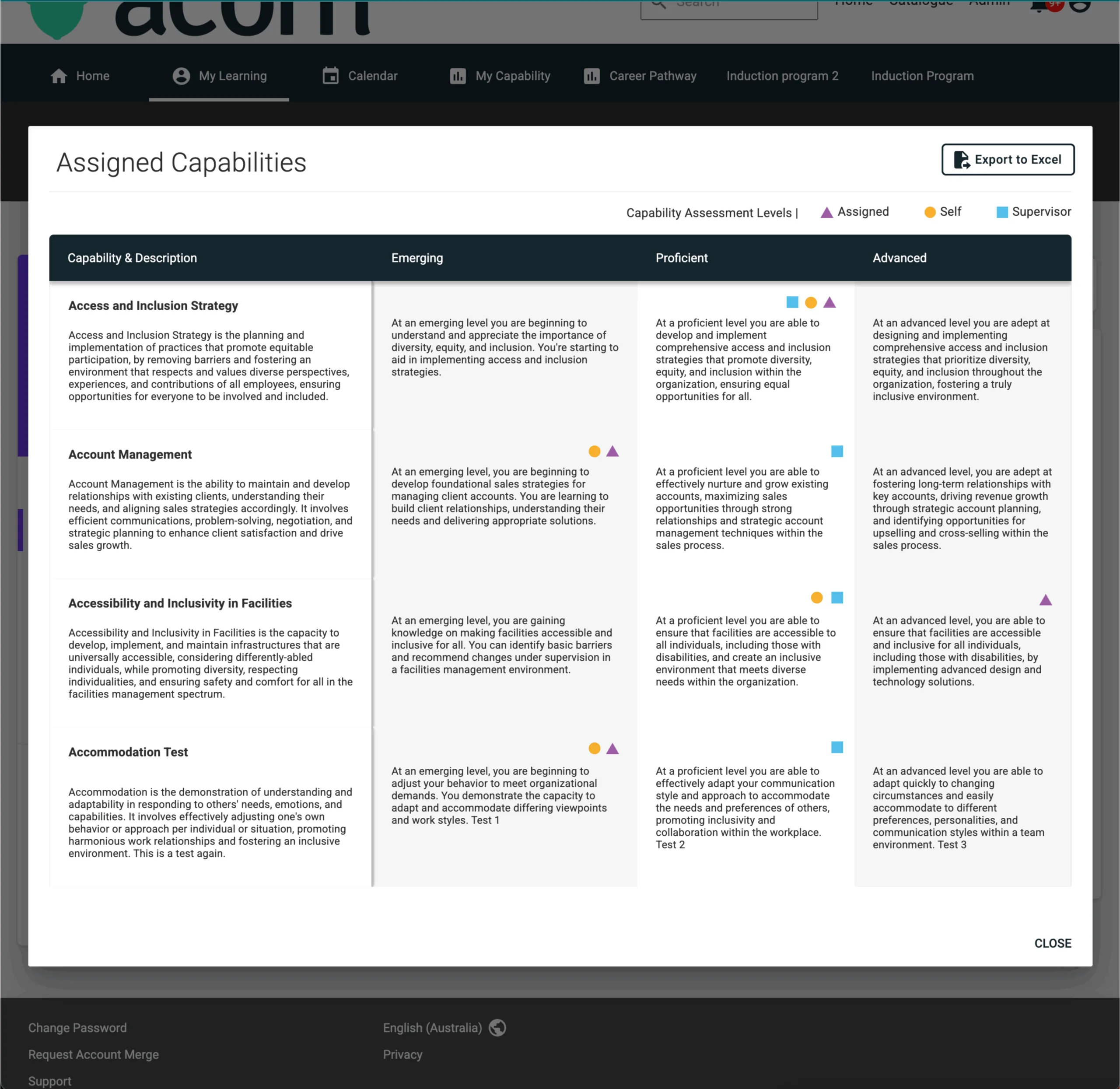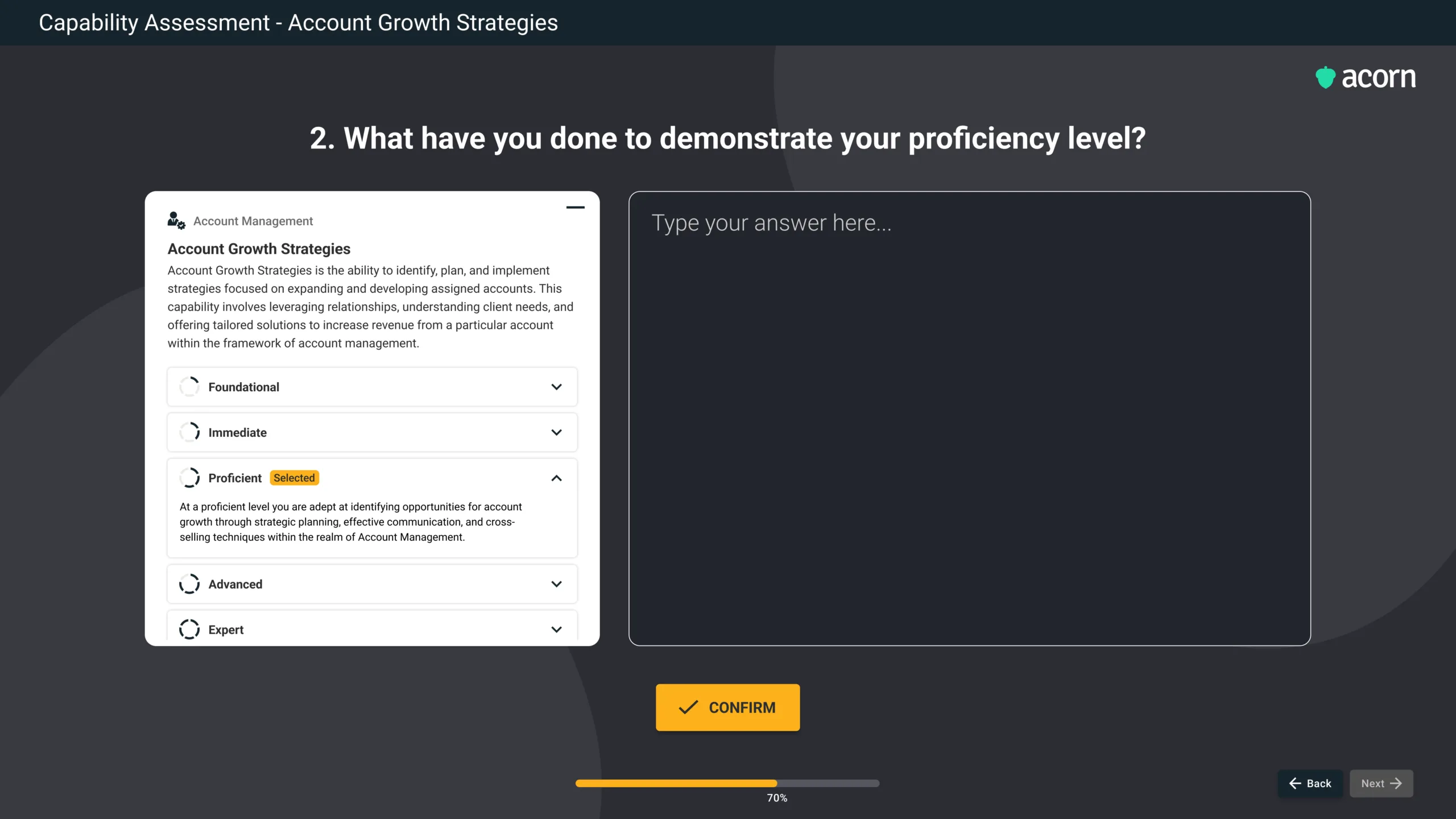Your Role in the New Capability System

Ben Satchwell
Head of Capabilities

When organizations launch new initiatives, it’s easy to think of them as something happening “out there”.
A new HR program, a fresh reporting process, another system to log into.
Capabilities are different. They’re not a side project. They’re about you and how you grow in your role.
The Acorn Capabilities module is designed to make this shift simple, clear, and meaningful. But for it to really stick, everyone has a role to play. This isn’t about replacing one evaluation form with another. It’s about creating a culture where development is transparent, consistent, and personal.
Why capabilities matter to you
Traditional evaluations often left employees feeling judged or boxed in. You’d sit in a review, hear a list of what you did or didn’t do well, and then wait another year for feedback. Not exactly motivating.
Capabilities flip that approach. Instead of focusing on the past, they give you a roadmap for growth. Each capability comes with clear proficiency levels, so you can see where you are today and what the next step looks like. That makes development less about guesswork and more about building confidence.

That matters, because you:
- Get clarity on what’s expected in your role
- Can see how your strengths line up with business priorities
- Know exactly what growth looks like, and how to get there
- Have a common language to talk about development with your manager.
In short, capabilities put you in control of your career.
What stays the same (and what changes)
Switching to capabilities doesn’t mean everything about performance management changes overnight. You’ll still have regular conversations with your manager, set goals, and receive feedback. But the focus of those conversations will change.
Instead of being told “You met three out of five objectives this year,” you’ll be able to look at your capabilities and say, “I’m currently at Developing in stakeholder management. To move to Proficient, I need to demonstrate X, Y, and Z.”
That’s a very different conversation; one that’s forward-looking, practical, and motivating.
Your role in making it work
Capabilities aren’t something that “happens to you.” They work best when you take an active role in using them. Here’s how:
- Engage honestly in assessments: The more accurate your self-assessment, the more useful the results will be. This isn’t about scoring points; it’s about mapping your growth.

- Use the language of capabilities: Talk about your development in terms of proficiency levels. That way, you and your manager are speaking the same language.
- Set development goals: Link your goals to the next capability level. That gives you a clear target and helps your manager support you with the right opportunities.
- Seek feedback: Ask your manager or peers for examples of how you’re demonstrating a capability. Use their input to track your progress.
- Own your growth: Capabilities are there to guide you, but the responsibility for development is yours. Use the framework to take control of your career.
How managers will support you
While you’re expected to own your growth, managers have an important role in supporting it. With the Acorn Capabilities module, they’ll be able to see where you’re at and use the framework to guide conversations.
For example, instead of vague feedback like “Improve your communication,” a manager can say: “Right now you’re at Proficient in communication. To reach Advanced, you’ll need to show you can adapt your style for different audiences.”
That’s clearer, fairer, and more useful.
What you can expect from Acorn
The Acorn Capabilities module isn’t just a set of definitions. It’s a practical system that:
- Provides clear capability descriptions and proficiency levels
- Links assessments to development opportunities, so growth is actionable
- Embeds capabilities into everyday processes like performance reviews and learning.
That means capabilities won’t sit in a folder you never open. They’ll be part of how you learn, perform, and progress in your role.
A shift in mindset
The biggest change isn’t in the system. It’s in how we think. Evaluations were about looking back. Capabilities are about looking forward. They’re not about proving your worth; they’re about helping you grow.
If you embrace that mindset, you’ll get the most out of the system. You’ll see that this isn’t a compliance exercise, but a genuine opportunity to take charge of your development.
Key takeaways
Your role in the capability system is simple but powerful:
- Be honest in assessments to get meaningful insights
- Use the language of capabilities in development conversations
- Seek feedback and track progress
- Take ownership of your growth.
Capabilities give you a roadmap. Our Capabilities module makes it practical. But it’s up to you to take the steps. This is your career, your growth, your capability journey.